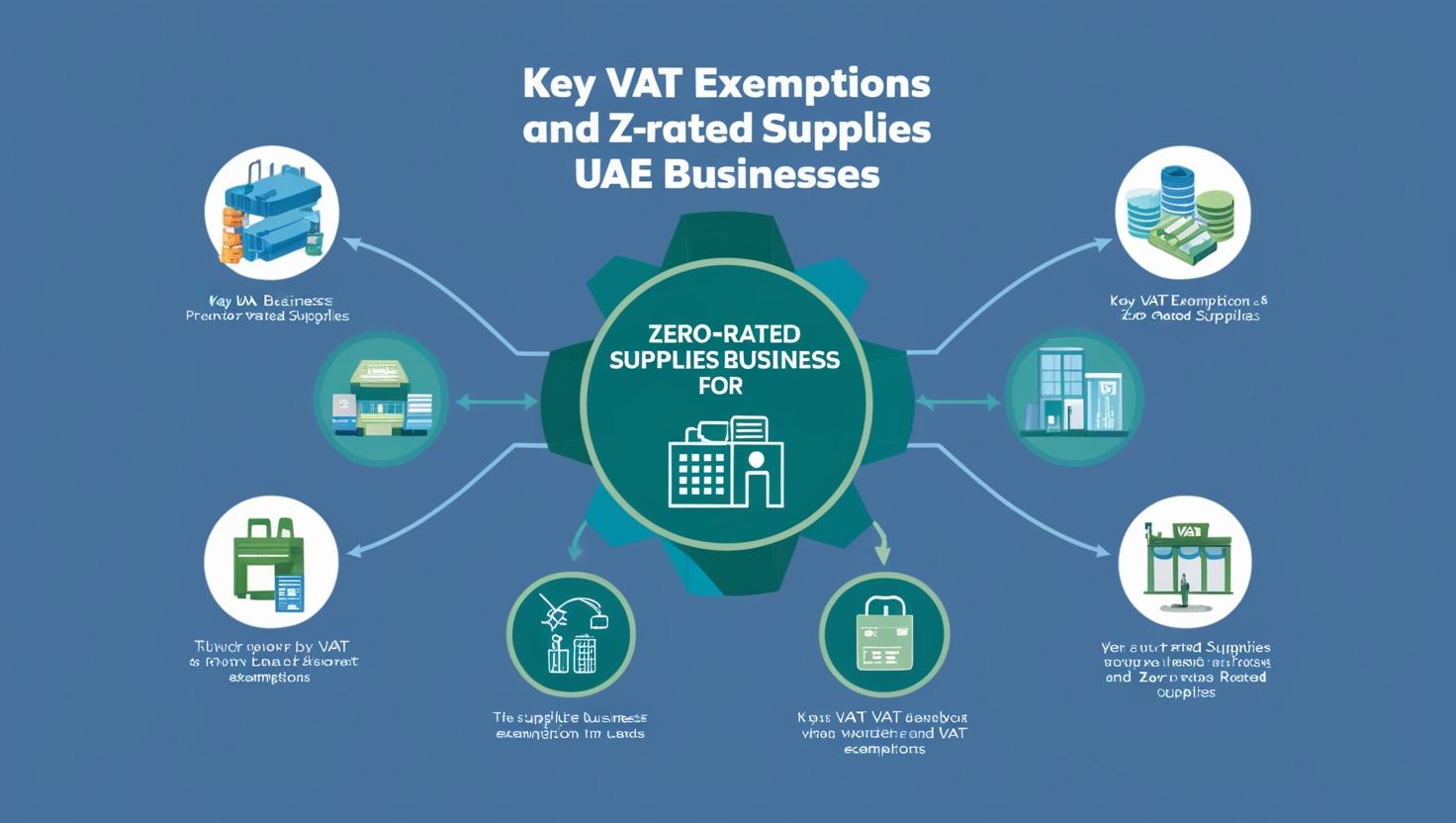VAT Exemptions and Zero-Rated Supplies: Key VAT Points for UAE Businesses

The Value Added Tax (VAT) system in the UAE classifies goods and services into three categories: standard-rated (5%), zero-rated (0%), and VAT-exempt. Understanding these classifications is essential for businesses to apply the correct tax rate, comply with VAT regulations, and avoid financial penalties.
In this blog, we will clarify the differences between VAT-exempt and zero-rated supplies, explain their impact on businesses, and provide guidance on how to apply the correct VAT treatment.
Understanding VAT Exemptions and Zero-Rated Supplies
The Federal Tax Authority (FTA) has categorized certain goods and services as either zero-rated or VAT-exempt to support economic sectors such as healthcare, education, real estate, and international trade.
The key differences between the two classifications are:
* Zero-rated supplies are taxable at 0% VAT, but businesses can still recover input VAT on related expenses.
* VAT-exempt supplies are not taxable, but businesses cannot reclaim input VAT on expenses related to these supplies.
Both classifications reduce tax burdens but have different effects on VAT recovery and compliance.
Key Differences Between Zero-Rated and VAT-Exempt Supplies
1. Zero-Rated Supplies (0% VAT)
Businesses selling zero-rated goods and services must charge 0% VAT on their invoices but can recover input VAT on business expenses.
Examples of Zero-Rated Supplies in the UAE
* Healthcare services and essential medications
* Educational services, including tuition fees
* International transport of goods and passengers
* Export of goods and services outside the UAE
* Certain residential real estate transactions (first sale of a new residential property within 3 years of completion)
Impact on Businesses Selling Zero-Rated Supplies
* Businesses must file VAT returns and report zero-rated sales.
* They can recover input VAT on costs related to zero-rated supplies.
* Proper documentation (invoices, shipping documents, and contracts) is required to justify zero-rating to the FTA.
2. VAT-Exempt Supplies (No VAT Applied)
VAT-exempt goods and services are not subject to VAT, meaning businesses do not charge VAT on sales and cannot recover input VAT on related expenses.
Examples of VAT-Exempt Supplies in the UAE
* Certain financial services (e.g., loan interest, insurance policies, financial transactions)
Bare land sales and leases
* Residential property leases (except for the first sale of new properties)
* Passenger transport within the UAE
Impact on Businesses Selling VAT-Exempt Supplies
* No VAT is charged on exempt supplies.
* Input VAT cannot be reclaimed, increasing business costs.
* Businesses must segregate VAT-exempt and taxable transactions for proper VAT filing.
How Businesses Should Apply the Correct VAT Treatment
1. Identifying VAT Treatment for Goods and Services
Businesses must determine whether their goods or services fall under zero-rated, VAT-exempt, or standard-rated (5%) categories. To do this, companies should:
* Review FTA guidelines to check VAT applicability.
* Consult tax experts to avoid misclassification.
* Keep accurate transaction records to ensure proper VAT filing.
2. Proper Documentation for Zero-Rated Supplies
For businesses applying 0% VAT, proper documentation is essential to prove eligibility. Required documents include:
* Export documentation (shipping invoices, customs declarations).
* Medical or educational service agreements to confirm zero-rated eligibility.
* Property sale agreements to validate real estate VAT classification.
3. Managing VAT Recovery for Zero-Rated and Exempt Supplies
* Businesses making zero-rated sales can claim input VAT, helping them reduce costs.
* Businesses selling VAT-exempt goods/services cannot claim input VAT, increasing expenses.
* Mixed suppliers (handling both taxable and exempt transactions) must apply partial VAT recovery methods.
Common VAT Mistakes and How to Avoid Them
1. Misclassifying VAT-Exempt and Zero-Rated Supplies
* Mistake: Charging 0% VAT on exempt supplies when no VAT should be applied.
* Solution: Carefully review FTA VAT rules and maintain proper records of exempt and zero-rated transactions.
2. Claiming VAT on VAT-Exempt Transactions
* Mistake: Recovering input VAT on expenses related to VAT-exempt supplies.
* Solution: Ensure expenses linked to VAT-exempt goods/services are not included in VAT refund claims.
3. Failing to Keep Proper Documentation
* Mistake: Businesses failing to maintain the required records for zero-rated transactions.
* Solution: Maintain detailed invoices, contracts, customs documents, and receipts for verification.
How Young and Right Can Help
Navigating VAT regulations in the UAE requires expertise to ensure businesses apply the correct VAT treatment, remain compliant, and optimize tax efficiency. At Young and Right, we provide comprehensive VAT consulting services to help businesses manage their VAT obligations.
1. VAT Compliance and Advisory Services
* Guidance on classifying VAT-exempt, zero-rated, and taxable supplies.
* Ensuring correct VAT filing to avoid penalties.
* Providing VAT risk assessment to mitigate tax errors.
2. VAT Filing and Documentation Support
* Assisting in VAT return filing and reporting of zero-rated/exempt supplies.
* Helping businesses maintain proper documentation for VAT claims.
* Advising on partial VAT recovery methods for mixed transactions.
3. VAT Audit and Dispute Resolution
* Preparing businesses for FTA VAT audits.
* Assisting with VAT dispute resolution and compliance issues.
* Reviewing financial records to ensure accurate VAT treatment.
4. VAT Training and Long-Term Support
* Conducting VAT training for finance teams to enhance compliance.
* Offering continuous VAT advisory services to help businesses adapt to new regulations.
* Providing long-term VAT support to optimize tax efficiency.
Conclusion
Understanding VAT-exempt and zero-rated supplies is essential for businesses operating in the UAE. While both classifications reduce tax burdens, their impact on VAT recovery, compliance, and record-keeping differs significantly. Businesses must correctly classify transactions, maintain proper documentation, and comply with FTA guidelines to avoid penalties.
Partnering with Young and Right ensures accurate VAT compliance, proper documentation, and efficient VAT filing. Our experts help businesses optimize VAT claims, reduce financial risks, and maintain full compliance with UAE VAT laws. Contact us today for specialized VAT advisory services and secure your business’s tax efficiency and compliance in the UAE.
